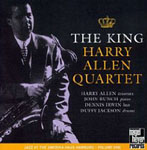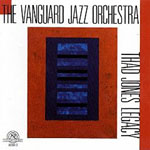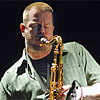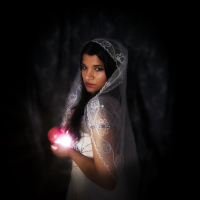Home » Jazz Articles » Interview » Dennis Irwin: Respect the Tradition
Dennis Irwin: Respect the Tradition
DI: Some guys take care of that part really early and some bass players who are playing great ideas but when they're walking 4/4 nobody feels the steadiness. It takes them longer to get the steadiness. We're all on different levels at different times, hopefully everybody trying to get better. Mel and Art didn't talk much about the music; they just let it take care of itself.
AAJ: Mel said he wanted the big band to sound like a small band, to have that real feeling of intimacy. He had complete control over his instrument and his sound and he knew how he wanted the band to sound. And he had been doing it for so long and with personnel changing. He had a complete conception of how the arrangements and the band were supposed to sound with an ear for everyone's individuality in their solos. The band was his instrument even more so than the drums. His sound had to have an effect on how people played in the band, how everybody felt.
 DI: Yeah. Thad's music too being a part of that. That was as much Mel's vehicle as the band or the Vanguard room. He was so comfortable in all those situations. He had learned Thad's music from the bottom up. Like when they just had 6 charts in the book, they'd go on the road and they'd play those six charts over and over again. He had taught himself the book from the very bottom. And playing the Vanguard year after year he knew what were the limits of the sound in there, what worked.
DI: Yeah. Thad's music too being a part of that. That was as much Mel's vehicle as the band or the Vanguard room. He was so comfortable in all those situations. He had learned Thad's music from the bottom up. Like when they just had 6 charts in the book, they'd go on the road and they'd play those six charts over and over again. He had taught himself the book from the very bottom. And playing the Vanguard year after year he knew what were the limits of the sound in there, what worked.
AAJ: His sound was always special whatever band he played in. Tempered force.
DI: The tones of his drums and his cymbals were all so pleasing, so carefully chosen. And that to me was the orchestral part of the jazz orchestra—the low sound in the bass drum and the lighter sound from the cymbals, the calfskin heads, the fluffy beater-balls and bass drum, very different from what 15 years ago was standard drum equipment. More guys are starting to experiment now with calf heads and getting different textures from different kinds of sticks. Mel's cymbals were so great; it was easy to get inside his sound, to match tones with Mel. Gut strings I liked thump-wise; it's really comfortable. I felt like I was inside his sound, already kind of like the barnyard between cat gut, calf skin, whole little menagerie. For me it was even a thrill to get to play those unbelievable arrangements in an acoustic space like the Vanguard.
Mel had a relaxed feeling off the stand and a relaxed feeling on the stand. Thad too, very relaxed and fun loving but the music was so serious that it created its own sound.
class="f-right">
AAJ: At the time you started there were few players playing gut strings. How did you make the change and what made you do it?
DI: When I started playing, steel strings were a foregone conclusion and pickups and amps. You had to get all your equipment so I just used the strings everybody told me that you use when you start out. Then, the more I kept asking older players, more experienced players than me about how the music had been different in the '50s and '60s, certain records, I had the chance to ask the real person who had done so and so. Then I started hearing a little bit about gut strings but I wasn't really sure what the deal was. Then this Down Beat Magazine—it was a bass issue and they were interviewing all these guys. They asked Mingus something, they said, "What about gut strings?" He said, "Don't ask me, ask that boy that plays with Ornette Coleman." He was talking about Charlie Haden who wasn't even with Ornette at that particular time. Just that kind of stuck in my mind—gut strings. I started asking what they were, asking at bass shops. They said those are hard to get, they don't make them anymore. But I searched some out. When I changed to gut strings I realized that was part of the sound that I'd been hearing on records. It was different from what I was able to do with my hands on steel strings.
AAJ: It requires different technique.
DI: Different fulcrum. You use the wrist and the elbow differently. These are much more floppy. Steel strings don't give like that. It's easier because they're mushier, they're thicker, softer on the fingers.
AAJ: Less bleeding.
DI: It's a different kind of force. It's different with the bow but nobody told Paul Chambers. I think that they're hard to play with a bow but he just played them. Blanton too. I think it has a beautiful sound. It has a certain throatiness, raspiness, some people say scratchy but I don't think it's scratchy. I don't perform that much bow myself but I practice mostly with the bow, the long tones and slow scales and slow melodies. (DI demonstrates technique differences between steel and gut strings).
AAJ: You're raising the strings up. It rings more, has a little more decay. What about decisions about amps?
DI: When I got in the band I was still using an amp at different times. But it was at the Vanguard that I realized how much sound you could get without the amp, putting a mike near the bass, or sometimes even with no mike. One time on a Loren Schoenberg (ts) gig at a hotel ballroom in New Jersey, [James] Chirillo [guitar] was playing, Mel and I. The dancers were way off in the other end. But when we came back for the third set I decided I would just try to do it like the Basie band in the old days—get Chirillo to turn off his amp. The dancers came up closer to where we were. 'Cause you could feel it's a palpable thing, acoustic sound, real and strong when everything's tight. I learned a lot that night from how it felt to play some Basie and Ellington repertoire with just acoustic instruments.
 AAJ: Well, there's an example of having a thought and bringing something to pass. And that's like—Mel told me on one of his first record dates they were gonna have the drums way away from everybody else because they were afraid the drums would be too loud. So he cried, "Why am I way over here?" He played very soft on purpose; they couldn't hear him so they kept moving him closer and closer to the rest of the band. That set a precedent for the way he was recorded in the studios. He didn't want to be far away from everybody and found a way to get closer. That feeling of intimacy was at the core of his playing in any situation.
AAJ: Well, there's an example of having a thought and bringing something to pass. And that's like—Mel told me on one of his first record dates they were gonna have the drums way away from everybody else because they were afraid the drums would be too loud. So he cried, "Why am I way over here?" He played very soft on purpose; they couldn't hear him so they kept moving him closer and closer to the rest of the band. That set a precedent for the way he was recorded in the studios. He didn't want to be far away from everybody and found a way to get closer. That feeling of intimacy was at the core of his playing in any situation.
Can you mention some of the lesser known people you like to play with and why? [Editor's Note: This interview was done in 1994 so "lesser known" doesn't really apply]. Maybe start with piano players, people you'd want listeners to check out, check their records out.
DI: (Mike) LeDonne, 'cause he likes to swing so hard but also he's always looking for new styles to play. He's investigating the Latin things, trying to get it authentic, always looking for a new tune, open to different sounds. Playing with him and Kenny together is a treat 'cause they complement each other so well just as a piano and drum combination. It's easy to play with them because they build little musical ideas together as a piano solo and as accompaniment to the other soloists.
Playing with (Michael) Weiss and Kenny together with Johnny—Michael has attention to detail. He's building up his repertoire, playing some old Duke Ellington things, stuff that Johnny showed him on piano. Michael's got insight on Monk and Bud too. John Campbell I enjoy a lot for a lot of different reasons. Lee Musiker is a pan-stylist. Playing a little with John Bunch on Scott Hamilton gigs. John knows a lot of different styles, has a sparkly, witty touch. Played a little bit over the years with people like Lightsey, Kenny Barron, Cedar Walton, Hicks, Larry Willis, George Cables, all masters.... Dom Salvador is one of my favorite piano players too. He's professor or my doutor of Brazilian music. Tardo Hammer is really fun and relaxed to play with, coming out of the Barry Harris, Sonny Clark school. It's a real treat playing with him and Leroy [Williams] together. Had a nice role just sitting back , it was really fun with them. Ralph Lalama with those guys is nice.
AAJ: How does Leroy hook up in your mind with Tardo? He gets most of the main action and then he contributes his own take on it too.
DI: Yeah, and that's what Tardo likes, the independence of the action instead of being very preconceived or contrived.
AAJ: Who are some of your favorite drummers to play with?
DI: Playing with Chuck Riggs with Scott Hamilton. Chuck's coming out of calfskin head, older style drumming, been listening to Papa Jo, Sonny Greer, Mel. Playing with Vernel (Fournier), he's got his tuning. Lewis Nash has a nice spring in his beat. Victor Lewis almost sounds like a co-composer of most of the tunes we play together. Victor Jones is fun to play with his knowledge of Afro-Latin combination. Andy Gonzalez has been one of my favorite bass players—jazz and Latin with his encyclopedic knowledge he brings—how Latin and jazz overlap, what works and why.
class="f-right">
AAJ: I want to ask you about your philosophy of playing with almost anybody and turning down almost nothing, assuming that it has something good to offer. What motivates you to do this?
DI: Maybe it's some blue collar work ethic.
AAJ: Well, a lot of people who are as known as you are don't leave the house for less than X dollars or won't play with someone unless it's guaranteed that the situation's gonna be musically exactly to their liking, but that's not you. Is it all work ethic or is it curiosity?
DI: I suppose it's a mixture of curiosity and the challenge to go out and try to make the sum greater than all of the parts that we know are gonna be there, whether it's a rehearsal band or just something thrown together at the last minute. But I think I probably just got it unconsciously from some old musicians, being around guys who I saw take any chance to play with anybody.
 AAJ: Like the fact that C. Sharpe [Clarence] and Junior Cook were always playing with young people whenever they had a chance? People like that?
AAJ: Like the fact that C. Sharpe [Clarence] and Junior Cook were always playing with young people whenever they had a chance? People like that?
DI: Yeah. The time playing with him and Tardo and Leroy, a year and a half of jam sessions at the Paris Lounge in Inwood back in '88. Junior was really something else and Leroy was the perfect drummer for him and was already one of his working band mates. They let Tardo and me slip right in there. Also, I remember working with Junior a few years earlier, during the whole fad of doubling up, tripling up on ballads. Kenny and I and Weiss were playing with him back when we were doing "Gallop's Gallop" and "Make the Man Love Me" at the [Angry] Squire. So Kenny and I stay in quarter-time, no hint of doubling. Junior turned and went, "Unmhm, doing that like the real guys do it."
AAJ: Anyone else who comes to mind who you always saw just doing it because it seemed like the right thing to do? It's almost like a priest with a day off. We need a priest and not only do we need a priest, we want you. Anyone else like that?
DI: Well Milt Hinton takes whatever kind of work he can get. I was reading something Pops Foster was saying, "Play with as many different people as you can." It's the same thing as what was happening in college when I started playing the bass. I'd play one session, it would be like an Albert Ayler thing. Somebody else was doing some stuff according to what Miles was doing electronically and some other guys up at Dave Glenn's house we called the Conservatory, just playing late '50s Riverside, Prestige and Blue Note kind of songs, and they were all stimulating and challenging to me, trying to get them right. I'm still searching for what I would be saying as a writer when I have a chance to make a tape, maybe this year or next year or whenever it is. I'm still looking for something to gel in my mind.
AAJ: What you're saying is besides work ethic and curiosity it's the idea of service or what can be learned, almost your spiritual duty.
DI: Yeah because each time you play might be your last. I realized that when I got to town that my enthusiasm for playing, my wanting to take any sort of session or rehearsal... Guys I knew my age whose technical prowess I was in awe of had stuff they were saying solo-wise. But I realized that the way I was gonna get to where I wanted to be faster was playing with other people as much as possible. Cats hated doing jam sessions, "being a slave," but there's another way of looking at that. It gave me a chance to learn a lot. I realized that my quickest growth was gonna come from taking every opportunity to play.
AAJ: What do you think of the crop of people coming up—bass players—and what would you say to them to make their life playing a useful one? What pointers can you give them?
DI: Don't lose your respect for tradition, the people that have put us in the position that we're in now. In a lot of ways, things have been made easy for us. Learn as many songs as you can correctly, know the words, be able to deliver them joyfully and completely and don't ever feel as though you've stopped learning.
AAJ: Do you ever learn anything from people younger than you?
DI: Of course. I remember at a certain point I was even messing around with leaving gut strings and I was hanging around with [Pat] O'Leary and [Joel] Forbes. They encouraged me to stay with it. Cats coming along like Ari [Roland], Ben Wolfe and [John] Webber. There's always something to get from those guys and their spirit. Peter Washington, I'm really inspired watching him play a lot of times. Greg Hutchinson, Justin Robinson, a whole bunch of people. Rodney Whitaker, a young player from Detroit is one of my favorites. He's a student of Ali Jackson. Curtis Lundy, Steve Neils, bassist from the Midwest, was in Africa for a long time—he's back in the Northeast now, he's one of my favorites.
AAJ: It might be a specific thing that they do which catches your attention but I guess it's enjoying the spirit of the person and how they make contributions to the situation.
DI: Yeah, seeing that they've been inspired 15 or 20 years later by some of the same things that made me want to play, get more deeply into it.
Selected Discography
Matt Wilson's Arts & Crafts, Scenic Route (Palmetto, 2007)
Gary Smulyan, More Treasures (Reservoir, 2007)
Joe Lovano, Streams of Expression (Blue Note, 2006)
Tardo Hammer, Tardo's Tempo (Sharp Nine, 2004)
Ted Rosenthal, Threeeplay (Playscape, 2001)
Johnny Griffin, Woe is Me (Jazz Hour, 2000)
Bob Mintzer Big Band, Homage to Count Basie (DMP, 2000)
Harry Allen Quartet, The King (Nagel-Heyer, 1999)
Vanguard Jazz Orchestra, Thad Jones Legacy (New World, 1999)
Joe Magnarelli, Always There (Criss Cross, 1998)
Jim Snidero, San Juan (Red, 1997)
Ken Peplowski, A Good Reed (Concord, 1997)
Steve Wilson, Step Lively (Criss Cross, 1995)
John Scofield, Groove Elation (Blue Note, 1995)
John Scofield Quartet, What We Do (Blue Note, 1992)
Thad Jones, The Definitive Thad Jones: Live from the Village Vanguard, Vol. 1 (Music Masters, 1988)
Mose Allison, Ever Since the World Ended (Blue Note, 1987)
Bennie Wallace, Sweeping Through the City Enja, 1984)
Art Blakey, In This Korner (Concord, 1978)
Dennis Irwin, Focus (Red, 1974)
Photo Credit
Lora Rosner
Tags
PREVIOUS / NEXT
Support All About Jazz
 All About Jazz has been a pillar of jazz since 1995, championing it as an art form and, more importantly, supporting the musicians who make it. Our enduring commitment has made "AAJ" one of the most culturally important websites of its kind, read by hundreds of thousands of fans, musicians and industry figures every month.
All About Jazz has been a pillar of jazz since 1995, championing it as an art form and, more importantly, supporting the musicians who make it. Our enduring commitment has made "AAJ" one of the most culturally important websites of its kind, read by hundreds of thousands of fans, musicians and industry figures every month.




















